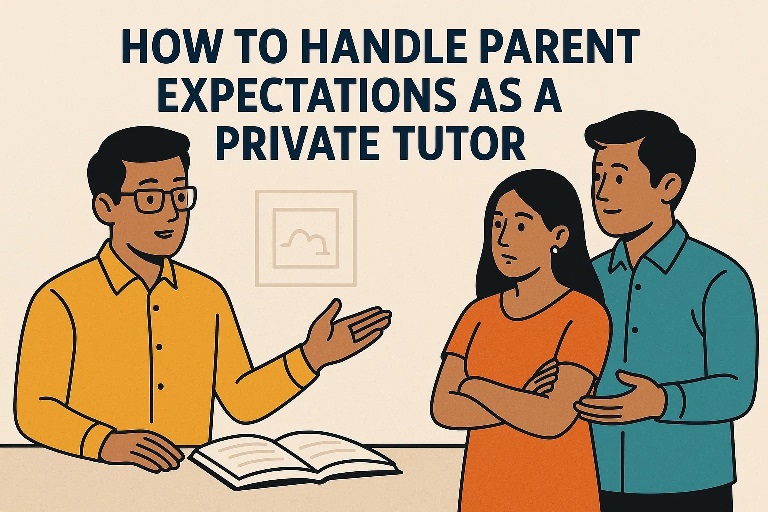As a private tutor, one of the most important – and sometimes most challenging – parts of the job is managing parent expectations. Parents are investing their time, trust, and money in you to help their child succeed, and naturally, they want to see results. But sometimes, their expectations may be unrealistic or not aligned with the student’s pace of learning.
Balancing what parents want with what the student actually needs takes skill, patience, and communication. In this article, we’ll explore how private tutors in India can effectively handle parent expectations while creating a healthy learning environment for students.
Why Managing Expectations Matters
According to a 2023 report by the Indian EdTech Consortium, more than 67 percent of parents surveyed admitted they had “high expectations” from private tuition. In urban areas, especially in metro cities like Delhi, Mumbai, and Bangalore, this number rises to nearly 80 percent. These expectations often include:
Drastic improvement in academic scores in a short time
Personalized attention to every subject
Daily performance feedback
Guaranteed board exam success
While these goals aren’t unreasonable, they are often not immediately achievable – especially if the child has foundational gaps or learning difficulties.
Common Challenges Tutors Face
Here are a few common situations that tutors encounter:
Unrealistic timelines: Parents want results in 2-3 weeks, even if the student is years behind.
Over-involvement: Some parents expect daily updates or want to sit through sessions.
Overloaded expectations: They may expect you to cover topics beyond what you’ve agreed to, like coaching for multiple subjects or competitive exams.
Mismatched goals: Sometimes parents want high marks, while the student just wants to pass.
Tips to Manage Parent Expectations Effectively
1. Set Clear Boundaries and Goals at the Start
During your first meeting with parents, clearly outline:
The subjects and topics you will cover
The expected duration for visible improvement
How often you will give updates
What you will not be responsible for (e.g., competitive exam prep unless agreed)
A written agreement or a simple message confirming the plan can help avoid misunderstandings later.
2. Communicate Regularly, But With Purpose
Instead of giving daily updates, consider weekly progress summaries. Share:
What was covered in the week
How the student performed
Any homework given
Areas of concern
You can use tools like Google Docs, WhatsApp, or simple handwritten notes. Keeping the communication consistent builds trust and reduces anxiety.
3. Show Progress with Evidence
Parents appreciate data. Use small assessments, quizzes, or before-after comparisons to show improvement. For example:
Pre-tutoring score: 48/100
Current average after 1 month: 62/100
These small wins help reassure parents that progress is happening, even if the child isn’t topping the class yet.
4. Educate Parents About Realistic Goals
If a child is in Class 8 and struggling with Class 6 concepts, explain that it may take time to rebuild the foundation. Use examples:
“A child who is afraid of math formulas needs time to first regain confidence before speed and marks can improve.”
Help them understand that tutoring is a process, not a quick fix.
5. Involve the Student in the Conversation
Sometimes, parents pressure tutors without understanding the student’s struggles. Let the child share their learning experiences. This makes parents more empathetic and helps them shift from performance-only focus to actual learning outcomes.
6. Stay Professional and Empathetic
Even if a parent is demanding or critical, stay calm and polite. Listen carefully, acknowledge their concerns, and respond with solutions. Avoid getting defensive. You can say:
“I understand your concern. Let’s give this method 3 more sessions, and then review the results together.”
Being solution-focused rather than emotional helps defuse tension.
Real-Life Example
Ritika Sharma, a tutor registered with IndiaTutor.in, shared her experience:
“When I started teaching a Class 10 CBSE student last year, the parents wanted the child to score 90+ in science, even though his previous score was just 52. I set small goals – chapter-wise mastery, weekly tests, and frequent feedback. I kept the parents informed every week. Within three months, the student’s confidence grew, and he ended up scoring 81 in the board exam. The parents were very happy, even though the original goal wasn’t met.”
This shows that when communication is clear and effort is visible, even slightly lower outcomes can be accepted positively.
The Bigger Picture
According to a 2022 ASER report (Annual Status of Education Report), nearly 37 percent of school-going children in India take private tuition. That number is growing rapidly, especially in classes 6–12. As the tutoring industry grows, so will parent involvement.
Handling expectations is no longer optional – it’s an essential skill for tutors to build long-term success.
My Thoughts
Being a tutor is not just about teaching a subject – it’s about building trust with both the student and the parent. When you set realistic goals, communicate clearly, and show results, parents become your strongest supporters. Managing their expectations well can lead to referrals, longer engagement, and a reputation that sets you apart in this growing field.
At IndiaTutor.in, we believe in supporting tutors with not just leads, but practical knowledge and resources to help them succeed. If you are a tutor or planning to become one, stay tuned to our blog for more real-world tips and teaching strategies.
By Nidhi Mehta, Founder of IndiaTutor.in


